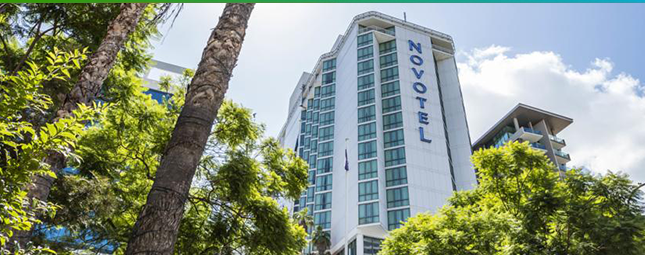
Novotel Brisbane is a 296-room hotel located in the city’s business district. Executive Chef Sean Collins has focused his food waste tracking at the breakfast buffet, which serves 150-400 guests daily. The savings he's realized have been reinvested in the kitchen, leading to better product and steady menu pricing. “The whole exercise has bolstered our competitive edge. Not having to increase our prices to compensate for cost of goods: that’s given us a head start above our competitors.”
Collins has lead his team to a 66 percent reduction in waste value and 62 percent cut in waste weight.
Novotel Brisbane's Path to Success
Start with the highest waste item
For Collins that was breakfast pastries. Based on daily waste data, he found danishes weren’t selling well, so he pulled back on production. Instead of doing a “bulk bake” of croissants in the morning, the team did two bakes, the second based on demand.
And they repurposed food waste: overproduced pastries turned into frangipane or bread pudding, or put through the food processor, rolled into balls, dipped in chocolate and served as a breakfast buffet special.
Take the savings from that and reinvest
The next highest waste item was deli meat. The cold cuts had to be heavily merchandised to make the buffet serving platter appear full, but demand didn’t warrant the abundant presentation. Collins pulled back on ham and turkey and, using savings from pastries, replaced it with smoked salmon. "In effect we’ve added value to our buffet.” To stretch the salmon, he created a spreadable smoked salmon salad to put on bagels.
Address unexpected spikes
Collins says once he sees waste levels “flat lining” he assumes he’s gotten waste down as far as it can go. But that doesn’t mean he stops tracking. Because things change, new crew comes in, new menu items are introduced. A kitchen isn’t static. Novotel Brisbane brought in a new breakfast chef recently who was tasked with updating their menu. As they tested new buffet items, they learned from Leanpath what was moving and what wasn’t moving. “It’s keeping us on the ball, if what we’re offering is actually what people want.”
Stay creative
Out of 60 kilos a week in oranges, Leanpath showed 20 kilos was showing up as waste: all from the peel. "It's a cost, we pay for it, what can we do with it?" Collins asked his team. They created house-made marmalade and a citrus cleaner made from orange peel and vinegar they now use in the kitchen.
Learn how foodservice operators around the world use Leanpath to prevent food waste.

